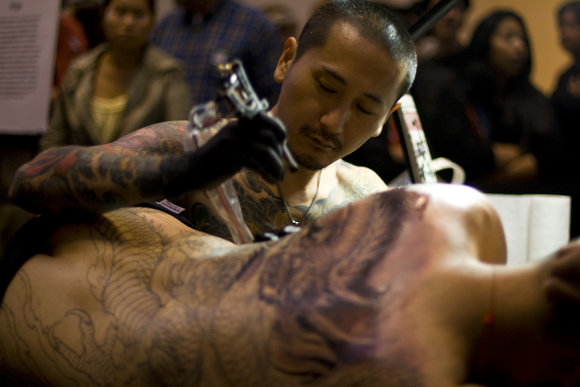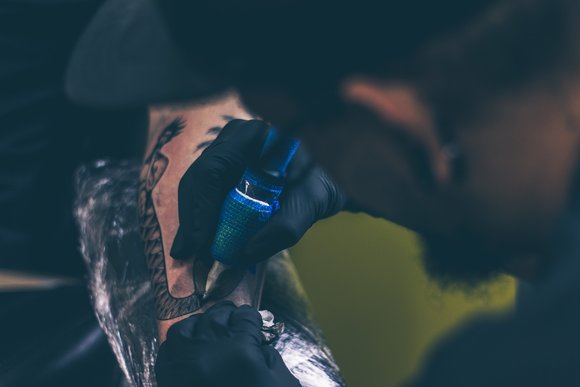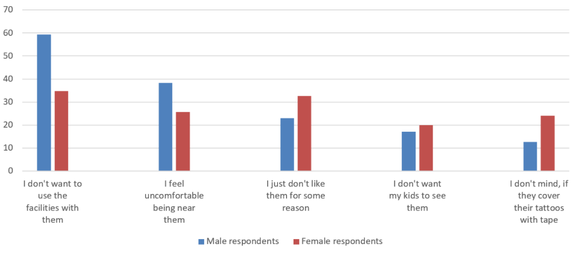
Osaka district court ruling says tattooing isn’t art, it’s a medical procedure.
A legal appeal by Osaka-based tattoo artist Taiki Masuda, who was originally fined 300,000 yen (US$2,663) for operating a tattoo parlour without a medical licence, has failed in his attempt to have tattooing reclassified as artistic expression, and brought out of the legal grey zone in which it sits.
Since 2001, tattooing has been legally classified as a medical procedure, since the needle pierces the skin (though ear, nose or other body part piercing doesn’t require a medical licence). As such, in Japan tattooing can only legally be performed by licensed medical professionals. Since the government doesn’t issue tattooing licences, tattoo artists in Japan are actually breaking the law unless they happen to also be fully-trained doctors. Unsurprisingly, such individuals are few and far between, and Masuda was one of several tattoo artists in Osaka who found themselves subject to police raids after a crackdown in 2015.
The Osaka District Court ruling found that Masuda was guilty but reduced the original fine by half, to 150,000 yen. Masuda’s lawyers have said that the ruling threatens the livelihoods of over 3,000 tattoo artists working in the country, and have announced they will be taking their appeal to a higher court.
Masuda, and his advocacy group, Save Tattooing, have said that want to persuade the government to set up a special licencing system for tattoo artists to ensure standards of practice and hygiene as in other countries, and to prevent tattooing from being driven underground.
Despite a long history of tattooing in Japan, tattoos are most associated with the yakuza organised crime gangs or historically as criminal penance, and social attitudes have been slow to change despite more and more young people getting themselves inked.
In a recent survey, an equal number of men and women were asked what they thought about using public facilities like pools or onsen hot spring baths alongside those who had tattoos (multiple answers were allowed).
Over a third of women, and almost two-thirds of men, didn’t want to visit onsen or pools alongside other users sporting tattoos, and only 24 per cent of women, and 12 per cent of men would allow them if they covered up their tattoos with tape or bandages.
While tattooed non-Asian foreigners may have some more leeway in terms of being allowed into onsen and pools, many of which have an outright ban on tattoos, those visiting Japan should make sure to check beforehand, and taking some body tape might be a good idea. It’s also worth remembering that tattoos are also banned in some other places, including some commercial gyms.
While the appeal moves towards the Supreme Court, we hope that the ruling doesn’t stop some Japan’s fantastically talented tattooists from practicing their art.
Sources: The Japan Times, Hamusoku
Featured image: Wikipedia/ScarTissueBloodBlister
Insert image: Pixabay



 Big win for tattoo artists: Japan’s Supreme Court rules medical licenses aren’t necessary
Big win for tattoo artists: Japan’s Supreme Court rules medical licenses aren’t necessary Tattooed Japanese woman suing nursing school after being suspended because of her ink
Tattooed Japanese woman suing nursing school after being suspended because of her ink Starbucks Japan releases first-ever Hinamatsuri Girls’ Day Frappuccino
Starbucks Japan releases first-ever Hinamatsuri Girls’ Day Frappuccino Eevee returns to Japan’s famous Tokyo Banana, bundled with a cute tote bag
Eevee returns to Japan’s famous Tokyo Banana, bundled with a cute tote bag Drift ice in Japan is a disappearing winter miracle you need to see now
Drift ice in Japan is a disappearing winter miracle you need to see now The fish in rural Fukui that rivals Japan’s most auspicious sea bream
The fish in rural Fukui that rivals Japan’s most auspicious sea bream Final Fantasy and Shinkansen announce collaboration with in-train audio play, SD art and merch
Final Fantasy and Shinkansen announce collaboration with in-train audio play, SD art and merch Convenience store onigiri rice balls become even more expensive…but are they worth it?
Convenience store onigiri rice balls become even more expensive…but are they worth it? Japan has only one airport named after a samurai, so let’s check out Kochi Ryoma【Photos】
Japan has only one airport named after a samurai, so let’s check out Kochi Ryoma【Photos】 We try the new Dom Dom Burger with a whole fried crab — best fast food near Sensoji temple
We try the new Dom Dom Burger with a whole fried crab — best fast food near Sensoji temple Take a trip to Japan’s Dododo Land, the most irritating place on Earth
Take a trip to Japan’s Dododo Land, the most irritating place on Earth Abuse Cafe Japan: We get abused by waitresses in maids’ uniforms at Tokyo’s viral pop-up diner
Abuse Cafe Japan: We get abused by waitresses in maids’ uniforms at Tokyo’s viral pop-up diner Highest Starbucks in Japan set to open this spring in the Tokyo sky
Highest Starbucks in Japan set to open this spring in the Tokyo sky The 10 most annoying things foreign tourists do on Japanese trains, according to locals
The 10 most annoying things foreign tourists do on Japanese trains, according to locals Tokyo Skytree turns pink for the cherry blossom season
Tokyo Skytree turns pink for the cherry blossom season Yakuzen ramen restaurant in Tokyo is very different to a yakuza ramen restaurant
Yakuzen ramen restaurant in Tokyo is very different to a yakuza ramen restaurant Shibuya Station’s Hachiko Gate and Yamanote Line stairway locations change next month
Shibuya Station’s Hachiko Gate and Yamanote Line stairway locations change next month Starbucks Japan releases new sakura goods and drinkware for cherry blossom season 2026
Starbucks Japan releases new sakura goods and drinkware for cherry blossom season 2026 Starbucks Japan adds new sakura Frappuccino and cherry blossom drinks to the menu
Starbucks Japan adds new sakura Frappuccino and cherry blossom drinks to the menu Japan Extreme Budget Travel! A trip from Tokyo to Izumo for just 30,000 yen [Part 1]
Japan Extreme Budget Travel! A trip from Tokyo to Izumo for just 30,000 yen [Part 1] Japan’s new “Cunte” contact lenses aren’t pronounced like you’re probably thinking they are
Japan’s new “Cunte” contact lenses aren’t pronounced like you’re probably thinking they are Japan’s newest Shinkansen has no seats…or passengers [Video]
Japan’s newest Shinkansen has no seats…or passengers [Video] Foreigners accounting for over 80 percent of off-course skiers needing rescue in Japan’s Hokkaido
Foreigners accounting for over 80 percent of off-course skiers needing rescue in Japan’s Hokkaido Super-salty pizza sends six kids to the hospital in Japan, linguistics blamed
Super-salty pizza sends six kids to the hospital in Japan, linguistics blamed Starbucks Japan unveils new sakura Frappuccino for cherry blossom season 2026
Starbucks Japan unveils new sakura Frappuccino for cherry blossom season 2026 Foreign tourists in Japan will get free Shinkansen tickets to promote regional tourism
Foreign tourists in Japan will get free Shinkansen tickets to promote regional tourism Naruto and Converse team up for new line of shinobi sneakers[Photos]
Naruto and Converse team up for new line of shinobi sneakers[Photos] Is China’s don’t-go-to-Japan warning affecting the lines at a popular Tokyo gyukatsu restaurant?
Is China’s don’t-go-to-Japan warning affecting the lines at a popular Tokyo gyukatsu restaurant? Survey asks foreign tourists what bothered them in Japan, more than half gave same answer
Survey asks foreign tourists what bothered them in Japan, more than half gave same answer Japan’s human washing machines will go on sale to general public, demos to be held in Tokyo
Japan’s human washing machines will go on sale to general public, demos to be held in Tokyo Starbucks Japan releases new drinkware and goods for Valentine’s Day
Starbucks Japan releases new drinkware and goods for Valentine’s Day We deeply regret going into this tunnel on our walk in the mountains of Japan
We deeply regret going into this tunnel on our walk in the mountains of Japan Studio Ghibli releases Kodama forest spirits from Princess Mononoke to light up your home
Studio Ghibli releases Kodama forest spirits from Princess Mononoke to light up your home Major Japanese hotel chain says reservations via overseas booking sites may not be valid
Major Japanese hotel chain says reservations via overseas booking sites may not be valid Put sesame oil in your coffee? Japanese maker says it’s the best way to start your day【Taste test】
Put sesame oil in your coffee? Japanese maker says it’s the best way to start your day【Taste test】 No more using real katana for tourism activities, Japan’s National Police Agency says
No more using real katana for tourism activities, Japan’s National Police Agency says